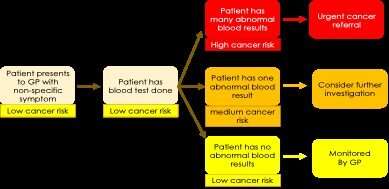This article has been reviewed according to Science X's editorial process and policies. Editors have highlighted the following attributes while ensuring the content's credibility:
fact-checked
peer-reviewed publication
trusted source
proofread
Common blood tests could improve cancer diagnosis for people with stomach pain or bloating

The results of routine blood tests could be used to speed up cancer diagnosis among people with stomach pain or bloating, suggests a study led by UCL researchers.
Most people who report these symptoms to their GP are referred for blood tests. However, it is not known how well these blood tests, used to explore a range of possible causes of ill health, can predict cancer risk.
The study, published in PLOS Medicine, looked at data from more than 400,000 people aged 30 or older in the UK who had visited a GP due to stomach pain and more than 50,000 who had visited their GP due to bloating. Two thirds of this group had blood tests following their appointment.
The researchers found that, in 19 commonly used blood tests, abnormal results were linked to a higher risk of being diagnosed with cancer within a year. They estimated that, if these abnormal results were taken into account, there would have been a 16% increase in the number of people with undiagnosed cancer who were given an urgent referral, compared to assessment based on symptoms, age and sex alone.
This translates as an extra six people with undiagnosed cancer being urgently referred out of 1,000 people who had visited the GP with stomach pain or bloating, on top of 40 people with cancer being urgently referred already, without using blood test results.
Lead author Dr. Meena Rafiq, of the UCL Department of Behavioral Science & Health, said, "Our study suggests we can improve cancer detection with blood tests that are already available and that are routinely given to patients with non-specific symptoms whose cause is unclear. This could be an efficient, affordable way to improve early cancer diagnosis and, in some cases, increase the likelihood of successful treatment.
"Given that in practice it may be challenging for GPs to interpret a range of blood test data, our study points to the need for an automated tool that could assess cancer risk based on multiple variables."
The study used anonymized patient data from the Clinical Practice Research Datalink (CPRD), collected from a network of GP practices across the UK between 2007 and 2016.
The researchers found that one in 50 (2.2%) people who went to the GP reporting stomach pain were diagnosed with cancer over the next 12 months. Precisely the same proportion (2.2%) of people reporting bloating were also diagnosed with cancer within a year.
In the UK, guidelines from the National Institute for Health and Care Excellence (NICE) say that people should be given an urgent cancer referral (i.e. referred to a specialist or for tests) if their risk of cancer is higher than 3%.
In the new study, the researchers found that people aged 60 or over who had gone to the GP with either stomach pain or bloating had a high enough risk to warrant an urgent cancer referral (that is, their risk was higher than 3%) regardless of blood test results. Currently, over-60s with stomach pain or bloating are only given a cancer referral in the UK if they have an additional potential cancer signal such as weight loss.
Risk of cancer was estimated to be 3.1% for men in their 60s reporting stomach pain, rising to 8.6% for men in their 80s with this symptom. For women in these age groups, the risk was 3.1%, rising to 6.1%.
The researchers cautioned that the incidence of cancer was likely to be higher in the study sample than among a broader group of people experiencing stomach pain or bloating who would not necessarily go to their GP or have blood tests.
In the UK study sample, the researchers found that, among people aged 30 to 59 years with abdominal pain or bloating, anemia, low albumin, raised platelets, abnormal ferritin, and increased inflammatory markers strongly predicted a risk of undiagnosed cancer.
For example, in women aged 50 to 59 with abdominal bloating, pre-blood test cancer risk of 1.6% increased to 10% with raised ferritin, to 9% with low albumin, to 8% with raised platelets, to 6% with raised inflammatory markers and to 4% with anemia.
Currently, only raised platelets and anemia are included in guidelines for cancer referral. The guidelines, the researchers noted, focused on the presence of 'alarm' symptoms and risk of cancer of a single organ, with limited guidance existing for vague symptoms that could be a sign of cancer in a number of different organs.
Dr. Rafiq added, "Half of all people with as-yet-undetected cancer will first go to the doctor with vague symptoms that can be challenging to diagnose. Many of these patients are investigated in primary care with commonly used blood tests that could help to identify which patients are most likely to have underlying cancer and should be prioritized for referral.
"This research shows these common tests can substantially enhance assessment of cancer risk."
The study also showed which types of cancer were most common for people with these symptoms and how this varied depending on age and sex. Overall, bowel cancer was most common, followed by prostate and pancreatic cancer in men, while in women bowel cancer was followed by breast and ovarian cancer.
The researchers said the findings on the predictive value of blood tests for cancer could not be extrapolated to other health systems with higher or lower rates of blood test use.
More information: Rafiq M, Renzi C, White B, Zakkak N, Nicholson B, Lyratzopoulos G, et al. (2024) Predictive value of abnormal blood tests for detecting cancer in primary care patients with nonspecific abdominal symptoms: A population-based cohort study of 477,870 patients in England. PLoS Medicine (2024). DOI: 10.1371/journal.pmed.1004426


















